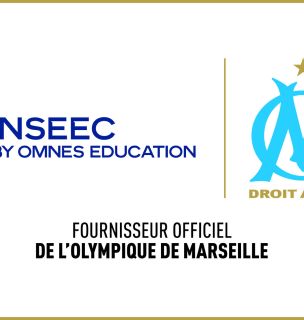Why choose the MSc Business Development & Engineering program ?
This program is aimed not only at learners wishing to complete their technical or commercial training, but also at professionals wishing to enhance their experience. The business developer must support the company’s growth strategy by creating value. They must be highly motivated to create or enhance their customer portfolio. The aim is to train business engineers to master the techniques of selling goods and services in a national and international context. They are true sales hunters. They must have excellent interpersonal skills and be at the cutting edge of innovation. A true sales strategist.
Training objectives
The objectives in terms of skills are to be able to :
- Design sales strategy
- Manage and secure sales strategy and its operational deployment
- Manage sales teams
- Manage the performance and excellence of sales activities
In addition to these common skill blocks, the following sector-specific optional blocks are also available :
- Managing innovation processes
Discover our MSc Business Development & Engineering

A 1 or 2-year diploma to become an expert in project management
- Hours 1st year of MSc : 441 hours
- Hours in 2nd year of MSc : 441 hours
How to apply for the INSEEC Master of Science Business Development & Business Engineering ?
The prerequisites requested
The conditions for accessing the certification system (excluding VAE) are:
- For entry into 4th year (MSc1): have validated 180 ECTS (level 6, Licence or equivalent) in one of the following fields: management sciences, sales and/or marketing, AES, economic sciences, engineering profile.
- For entry into the 5th year (MSc2): 180 ECTS (level 6, Bachelor’s degree or equivalent) in one of the following fields: management sciences, sales and/or marketing, AES, economics, engineering profile.
Would you like to find out more about the MSc Business Development & Engineering program? Sign up for an information meeting !
Would you like to find out more about the admission requirements for our Business Development & Engineering course ?
What are the courses for a Master of Science in Business Development & Business Engineering ?
The courses presented below are given as examples, and may vary slightly depending on the teaching campus. Course content is adapted each year to market developments and is updated before the start of the new academic year.
1st year courses
CROSS-DISCIPLINARY & FUNDAMENTAL COURSES – 1ST YEAR
BUSINESS ENGLISH
Refine English comprehension and communication skills in a wider context than just business English. Students may be required to take the TOEIC test, depending on the host campus.
SOFTWARE & DECISION-SUPPORT TOOLS
The aim of this module is to enhance learners’ IT skills to meet the needs of companies in terms of budgeting, sales, project management, personnel management and communication: Excel, Word, Powerpoint, teamwork tools, business software. The aim is to get the most out of office automation tools, quickly identify and correct errors, customize existing tools or create your own.
BUDGET MANAGEMENT & DASHBOARDS
The aim is to acquire key skills in budget management and reporting. Emphasis will be placed in particular on budget architecture, with the implementation of summary documents, project management control and its link with budget management, and the creation and management of dashboards.
PROFESSIONAL TOOLS & METHODS
This module enables learners to improve their CVs and posture through role-playing exercises (business game, professional simulation, public speaking, etc.); practical and professionalizing workshops (CVs, professional social networks, coaching, etc.) as well as professional conferences and master classes.
CORPORATE STRATEGY & BUSINESS PLAN
A precise methodology for analyzing customer needs, market structure and competitor dynamics to identify opportunities and threats is presented.
NEGOTIATION
- This seminar focuses on negotiation in a national and international context.
- In particular, the cultural dimension will be taken into account and its impact on an international negotiation defined.
- The national negotiation will focus on the sales process through role-playing.
SPECIALIZED COURSES
SALES FORCE MANAGEMENT
The aim is to establish an optimal structure for the sales team, proactively monitor and control performance, evaluate performance and stimulate sales motivation, and optimize results through effective sales force management.
BUSINESS LAW
- Presentation of the legal framework governing commercial transactions; categorization of contracts; practical study of formation (consent, capacity and object of the contract) and contractual performance; specific aspects and essential clauses of the sales contract; drafting of general conditions of sale; principles of liability.
- Exploration of the main conventions of business law.
- Understanding the fundamentals of contract law and company law.
- Analysis of the impact of business taxation on management decisions.
CUSTOMER RELATIONSHIP MANAGEMENT
This module aims to explore the different aspects of CRM in an integrated way, emphasizing its strategic importance for businesses and providing learners with the skills they need to design and implement successful CRM initiatives.
MARKETING & SALES STRATEGIES
- Master market analysis tools (demand, competition, products, environment).
- Understand consumer behavior (qualitative and quantitative studies, introduction to panels), as well as the main factors influencing purchasing.
- Approach the marketing and sales resources used to achieve the sales objectives set by the company.
- Analysis of the company’s complexity and study of its environment.
CUSTOMER PATH
- This course covers the key concepts and performance levers of the customer journey.
- Brands have recognized that the customer experience, i.e. the perception felt by the customer throughout the relationship with the brand, is a major issue.
- From the origins of the customer journey to its evolution, students will study the essential steps involved in creating a customer journey.
DISTRIBUTION STRATEGIES
- Provides a comprehensive vision of different distribution strategies, defining the best distribution strategy for the company when launching a product or service offering.
- It enables you to adapt this strategy to time and budget constraints, as well as to changing customer consumption habits, particularly in the face of digitalization.
TEAM MANAGEMENT & LEADERSHIP
- The practical application of major corporate strategic theories is addressed through strategic case studies, corporate consulting and organization, and the development of the need to organize, plan and implement strategy to contribute to the smooth running of the company.
MARKETING B2B
The aim of this module is to understand the specifics of B-to-B marketing in a business context, to analyze marketing strategies and tactics adapted to business-to-business transactions, to explore effective communication tools and channels for targeting businesses, and finally to acquire the skills needed to develop relevant and effective B-to-B marketing plans.
DIGITAL MARKETING & CRM
- Understand digital channels to sell a product or promote a brand to consumers.
- Developing the use of the Internet and connected objects. Use of CRM (Customer Relationship Management).
- Understand corporate strategies for managing relationships with customers and prospects.
PROMPT ENGINEERING
- Introduction to the fundamentals of interacting with generative artificial intelligences such as ChatGPT, DALL-E and other LLM models.
- Learn how to write and optimize effective prompts to exploit the full potential of these tools in a variety of contexts, such as content creation, productivity and automation.
- This module also addresses the ethical issues, limitations and biases of AI to promote responsible use. Through practical exercises and case studies, this course provides a solid foundation for deepening skills in generative artificial intelligence.
INNOVATION & CHANGE MANAGEMENT
- Provides a global vision of how to stand out from the market and improve productivity, reduce costs, establish partnerships, encourage teams to be creative, and focus on continuous improvement.
- Provides an approach to the marketing and sales resources needed to achieve the sales objectives set by the company.
SALES TECHNIQUES & COMMERCIAL EXCELLENCE
- Exploring strategies for converting prospects into customers.
- Making a successful sale, qualifying, preparing and carrying out appointments.
- Maintaining a lasting relationship with your customer through a BtoB and BtoC approach.
PURCHASING & LOGISTICS
Determining the scope of the purchasing act in relation to business activity, the role of suppliers in the purchasing process, negotiating prices and lead times, and managing transport and storage.
EXAMS & SUPPORT
WRITTEN EXAMS
2nd year courses
BUSINESS STRATEGY
BUSINESS STRATEGY & SALES DEVELOPMENT
- Understand the challenges of a strategic approach to ensure the company’s long-term viability in a risky, ever-changing environment.
- Analyze the company’s identity, organization and resources to position it for sustainable development.
- Diagnose the company’s environment, assessing its ability to compete and adapt to changes in the business world. Define and implement competitive advantages.
MARKETING & SALES STRATEGIES
- Audit business strategy in order to make the right decisions.
- Draw up a marketing and sales plan that capitalizes on the company’s competitive advantages.
- Understand the particularities and strategic importance of international marketing.
- Discover the specificities of the international environment: Europe, America, Asia/China.
- Develop a marketing plan.
- Build market penetration strategies.
MARKET RESEARCH & BUSINESS DEVELOPMENT
- Master the operational tools of market research and apply them to a project linked to the company’s growth strategies.
- Involve stakeholders and detect potential customers.
RESEARCH PAPER
- The applied research dissertation aims to develop analytical and reflective skills around a managerial issue.
- It is an opportunity for students to demonstrate their rigor in analyzing a problem or managerial issue and formulating operational recommendations.
- The research dissertation reflects the student’s research work and enhances the professionalism of the course.
MANAGEMENT & OPERATIONAL DEPLOYMENT
ACQUISITION & LOYALTY TECHNIQUES
- Acquiring new customers and retaining existing ones is a major lever in a company’s marketing strategy.
- DISCOVER various methods and strategies for attracting new customers and then reactivating them.
- LEARN how to monitor certain indicators, enabling them to define and prioritize actions to be implemented.
TENDER MANAGEMENT AND NEGOTIATION
- Understand tender management, from analyzing specifications to submitting a competitive bid.
- It covers negotiation strategies, stakeholder management and margin optimization.
- The emphasis is on persuasion techniques and adapting to customer needs.
- The aim is to master the complex sales cycle and improve the conversion rate of business opportunities.
COMPLEX SALES AND B-TO-B SALES TECHNIQUES
- Understand the specifics of complex B-to-B sales, from identifying needs to closing the deal.
- It covers prospecting strategies, advanced negotiation techniques and the management of long sales cycles.
- The emphasis is on understanding decision-makers, creating value and managing objections.
- The aim is to develop effective sales approaches to maximize conversion rates and build customer loyalty.
KEY ACCOUNT STRATEGY
- Develop a customer-focused sales approach; understand the psychological drivers of purchasing decisions and the behavior of players in the purchasing cycle.
- Learn key account development techniques through the use of tools, role-playing and simulations.
TEAM MANAGEMENT
INTERNATIONAL METHODS OF MANAGEMENT
This course will help students gain essential, and strategic knowledge of current trends facing Human Ressources professionals in the field of international HRM. Working in teams, participants will learn to analyze data and transform HR strategy into plans of action.
TEAM & TALENT MANAGEMENT
- From recruitment and training to the implementation of an attractive remuneration policy, processes, procedures and indicators to be put in place to ensure effective management of employees and their missions within the company.
METHODOLOGY & DECISION-SUPPORT TOOLS
- The aim of this module is to develop students’ IT skills to meet the needs of companies in terms of budgeting, sales, project management, personnel management and communication: Excel, Word, Powerpoint, teamwork tools, business software.
- The aim is to become proficient with office automation tools, quickly identify and correct errors, customize existing tools or create your own.
PROFESSIONAL TOOLS & METHODS
This module enables learners to improve their CVs and posture through role-playing exercises (professional simulation, public speaking, etc.); practical and professionalizing workshops (CVs, professional social networks, coaching, etc.) as well as professional conferences and master classes.
COMMERCIAL EXCELLENCE
DISTRIBUTION STRATEGIES
- Choosing a multi-channel, cross-channel and omni-channel distribution strategy.
- Take into account the need to adapt to new consumer behaviors by integrating a digital strategy.
- Implement a cross-channel strategy and create a complementary and interactive strategy between the different channels to deliver a single, identical message to the customer.
- Set up specific marketing offers, individualize and personalize the offer proposed to the customer.
CUSTOMER ENGINEERING & CRM
- Set up a customer-oriented organization.
- Implement CRM tools.
- Draw up a sales action plan.
- Select and respond to calls for tender.
- Build a negotiation strategy.
LEGAL & CONTRACTUAL ASPECTS OF THE SALE
- Supplier/distributor relations: understand the impact of the Raffarin, Galland, NRE, Dutreil and LME laws and circulars on commercial policy, negotiation markets and commercial relations.
- Draw up general conditions of sale, CPVs, commercial cooperation and annual contracts with distributors.
- Distributor/consumer relations: consumer law, information obligation, price display, regulated and prohibited practices.
- Warranties and after-sales service.
BUDGETING & REPORTING
- Implement management tools (budget forecasts, dashboards and reporting) and analyze data to optimize decision-making.
- Draw up budget forecasts in line with strategy and objectives.
- Set up and operate budgetary control within a reporting framework.
- Organize forecast management and monitor cash flow.
E-COMMERCE & M-COMMERCE
- Plan the various stages involved in setting up a connected commerce strategy, based on specifications.
- Define and deploy an e-commerce / m-commerce strategy: application and/or responsive design, payment solutions, business model, use of geolocation, specific mobile-related services, chatbot.
- Implement appropriate, secure payment solutions.
- Design a simple, effective connected commerce interface to encourage purchases and loyalty.
- Give visibility to your offer to develop traffic: referencing, display, e-mailing, retargeting, price comparison.
- Continuously monitor and adjust the effectiveness of your visibility strategy.
- Understand the principle of growth hacking, its challenges and limits, and its variant, growth marketing.
INNOVATION PROCESS MANAGEMENT
INNOVATION MARKETING
- Explores strategies for bringing innovations to market.
- It covers trend analysis, adopter segmentation and innovative product positioning.
- Emphasis is placed on disruptive approaches, risk management and experiential marketing.
- The aim is to design and deploy effective strategies to maximize the adoption and profitability of innovations.
LAUNCH OF NEW PRODUCTS
- Understand new product launch strategies, from market analysis to operational implementation.
- It covers demand research, positioning, communication and product lifecycle management.
- The emphasis is on planning, team coordination and optimization of the marketing mix.
- The aim is to maximize the impact of the launch and ensure rapid market adoption.
TECHAWAY NLP & LLM
- In-depth training in the customization and deployment of large language models (LLMs) in real-life environments.
- Learn how to fine-tune these models for specific needs, integrate them into secure production pipelines, and design advanced applications such as intelligent chatbots and recommendation systems.
- This module focuses on best practices, technical and ethical challenges, enabling participants to master the use of LLMs on a large scale and exploit them optimally in professional contexts.
EXAMS & SUPPORT
EXAMS
- Written examinations
- Dissertation defense
What are the start dates and study rhythms ?
There are two re-entries per year, in February/March and September/October. To check the start date of each intake, contact the admissions department directly.
The pace of courses may vary from campus to campus.
Work-study contracts must be signed for 12 months (MSc 2) or 24 months (MSc1 + MSc 2).
To find out the length of the staggered start contract, contact the admissions department of the campus you are interested in.

What career opportunities are there after an MSc Business Development & Business Engineering ?
- Sales manager
- Sales development manager
- Business development manager
- Sales Manager
- Project Manager / Consultant
- Business engineer / Sales engineer
For detailed job descriptions by specialization, click here.
What business skill sets have been developed ?
The professional certification allows you to prepare for the following blocks of skills :
- Design sales strategy
- Manage and secure sales strategy and its operational deployment
- Manage sales teams
- Manage the performance and excellence of sales activities
In addition to these common blocks of skills, the following optional sector blocks are also available :
- Managing innovation processes
Description of how to acquire certification by capitalizing on blocks of skills and/or by correspondence
Certification is obtained by :
- Validation of four skill blocks common to all courses, plus a specialization block depending on the candidate’s course (each skill block must be passed with a grade of 10/20 or higher).
- A minimum 132-day work placement during the second year of the program (MSc 2).
Professional certification
Level 7 (EU) “Business Development Manager” professional certification, NSF code 312, issued by INSEEC MSc (CEE-SO, CEE-RA, CEE-OUEST, CEE-M, CEFAS, MBA INSTITUTE, ADEFI FORMATION), registered under number 39884 in the RNCP (Répertoire National des Certifications Professionnelles) by decision of the Director General of France Compétences on November 28, 2024.
Certification is awarded by capitalizing on all the skills blocks. Each skill in a block must be confirmed to obtain the block of skills. Partial validation of a block is not possible. It is also accessible via the Validation of Acquired Experience.
To find out more about the blocks of skills associated with this RNCP qualification, click here.
What are the teaching methods ?
Teaching methods
- Lectures and interactive courses
- Situational exercises through collective and/or individual case studies carried out by the students
- Conferences, seminars and/or educational visits
Evaluation methods
- Individual or/and group case studies
- Individual or/and group oral presentations
- Individual or/and group files
- Applied research disertation with individual oral presentation
Methods and tools
- The evaluation methods are face-to-face, in the form of continuous assessment or final exams in the form of mid-term exams.
What are the 2025/2026 tuition fees to enter the program ?
FALL INTAKE – 2025
Initial training:
- MSc1: €10,990
- MSc2: €12,950
Apprenticeship program:
- 24 months : €23,400 before tax
- MSc2 : €13,490 before tax
International students pack
Mandatory fee of €700 for exclusive support services for international students living outside the European Union.
SPRING INTAKE – 2026
Initial training:
- MSc1: €10,990
- MSc2: €12,950
Apprenticeship program:
- 24 months : €23,400 before tax
- MSc2 : €13,490 before tax
International students pack
Mandatory fee of €700 for exclusive support services for international students living outside the European Union.
In the context of work-study training, tuition fees are payable by the OPCO and the company signing the contract.
Do you have any questions about work-study or our school in general ? Consult our frequently asked questions.
VAE/VAP
- VAE: €4,800 before tax
- VAP: €850 before tax
International students pack
Mandatory fee for exclusive support services for international students living outside the European Union.
- Fall intake (2025) – September/October: €700
- Spring intake (2026) – February/March: €700
Application fee
The application fee is €80.
What financial assistance does INSEEC offer ?
INSEEC offers a number of financial aid schemes :
- The alternating rhythm, in internship or work-study contract.
- The right to training via the CPF.
- Banking partnerships.
In the case of work-study training, tuition fees are payable by the OPCO and the company signing the contract.
Key figures for the RNCP Business Development Manager qualification
99%
National success rate – Class of 2024
97%
Presentation rate – Promo 2024
84%
Overall integration rate – Class 2023
84%
6-month satisfaction rate – Class of 2023
* Details are available in this document (national results and by regional certifier).
What is our school’s disability policy ?
The OMNES Education Group pays particular attention to the societal environment, including the disability dimension. Indeed, we believe that students with disabilities should not have any problems in pursuing their studies and starting a professional career. We accompany them to facilitate their access to the premises, offer them personalized advice as well as adapted accommodations throughout their school career.
Accessibility of premises: all our campuses are accessible to people with disabilities.
To learn more about the OMNES Education Group’s disability policy, click here.
Contacts for disability referents by campus:
- Bordeaux: Maxime DOUENS – mdouens@inseec.com
- Lyon: Anissa GASMI – agasmi@inseec.com
- Rennes: Laura LE CALVEZ – llecalvez@omneseducation.com
- Paris: Farid HAMAD – fhamad@inseec.com
- Chambéry: Clément BERTACCO – cbertacco@inseec.com
- Marseille: Océane VALOTTI – ovalotti@omneseducation.com
- Toulouse: Amanda MARNEIX – amarneix@omneseducation.com
News

June 2024
INSEEC hosted the CFNews Grands Prix de la Croissance Externe Sud Ouest for the second year running
Read more





